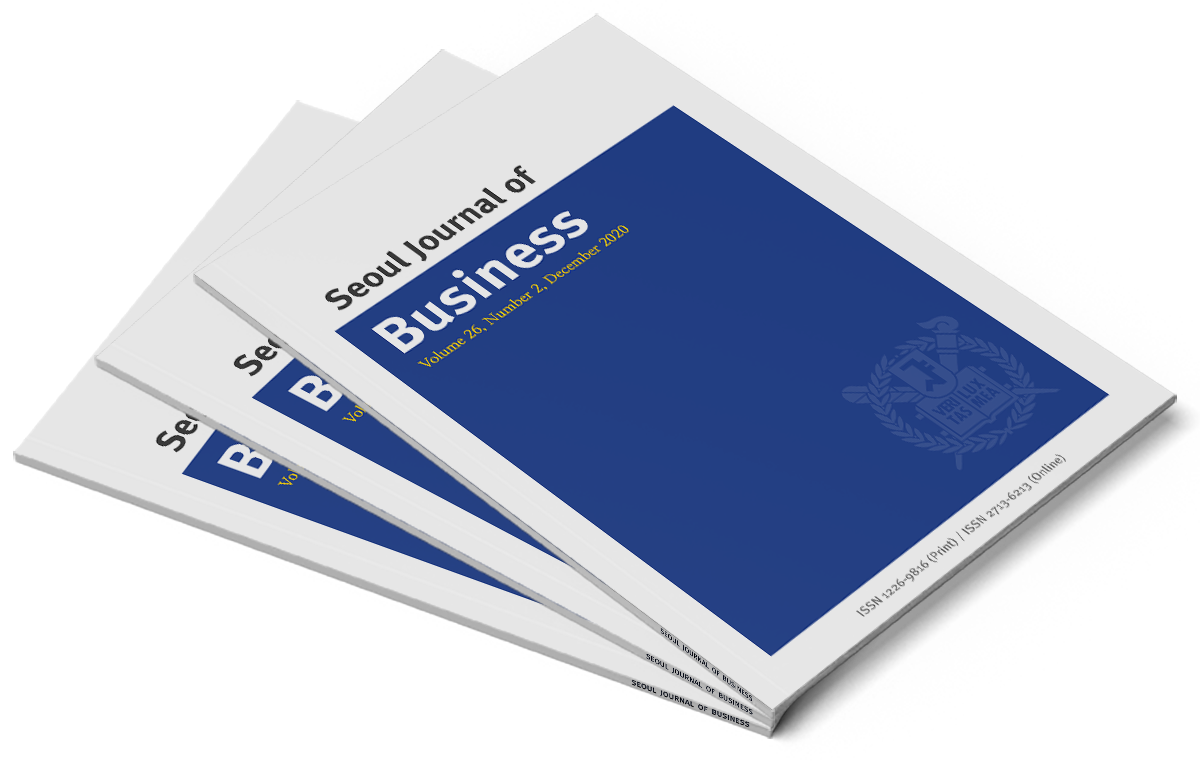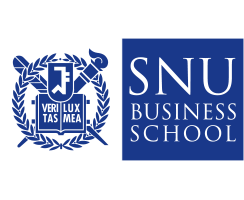Recent Issues
Vol.20/1 (2014, June)
Risk and Reward in Venture Capital Funds
Author Joon Chae, Jee-Hyun Kim, and Hyung-Chul Ku
Keywords venture capital funds performance, risk-adjusted measure, selection-bias, government participation
Download
Using detailed data from Korea, free from the selection bias problem and providing industry codes for companies a venture capital (VC) fund invests in, this study conducts comprehensive analyses of performance and performance persistence of VC funds. We find significant differences between the results using a non-risk-adjusted and those using a risk-adjusted performance measure. Another notable finding is that government participation affects the risk-adjusted performance and cash inflows of venture capital funds. Furthermore, the persistence of performance is much weaker when we control risk of VC funds. In addition, we provide the evidence that the performance in a public market has a positive influence on the probability of raising subsequent venture capital funds.
Vol.20/1 (2014, June)
Organizational Knowledge and Localized Competition: A Case of a High Performer that is Socially Constructed
Author Jonghoon Bae
Keywords Localized Competition, Knowledge-based View, Interfirm Rivalry, Social Construction
Download
This study seeks to elucidate conditions under which high performers emerge independent of their internal resources even when competition in the output market is intense. In particular, I present an extended model of localized competition in which ‘ill-informed’ producers compete with each other by ‘observing’ the actions of their rivals and ‘inferring’ the association between the cost and benefit of their action from observable market response to the action of their rivals. To this end, I combine three independent streams of research, including the ecological model of localized competition, organizational knowledge and Harrison White’s model of market (Carroll and Hannan 2000; Garicano 2000; Grant 1996; Nelson and Winter 1982; White 1981). An analytical strategy chosen is to parameterize the interplay of organizational knowledge and localized competition so that this study seeks to theorize a general competitive process that underlies the emergence of high performers without ignoring the role of firm heterogeneity in internal resources. In particular, this study characterizes market competition with respect to four parameters, including (1) the size of the neighborhood of a firm, (2) the upper and (3) lower bound of knowledge bases, and (4) a type of the market. The implications of this model are further explored in the context of multimarket competition as well as resource-partitioning.
Vol.20/1 (2014, June)
How Does the Use of External Knowledge Influence Innovative Performance of Service Firm? An Introductory Study of Openness and Service Innovation
Author Seongwuk Moon
Keywords Openness to External Knowledge, Types of Innovation, Innovation Performance, and Korean Service Firms
Download
This study examines how the use of external knowledge influences innovative performance of Korean service firms. Especially, this study underscores whether the relationship between external knowledge and innovation in Korean service industries differs from the relationship in Korean manufacturing industries found by Moon (2011). Using 2006 Korean Innovation Survey in service sector, this study tests whether the use of external knowledge improves innovative performance and how absorp¬tive capacity, new startup and appropriation methods moderate the effect of the use of external knowledge on Korean service firms’ innovation. The relationship between openness and innovative performance in service is different from that in manufacturing in Korea: First, openness in service is more effective for radical innovation than for incre¬mental innovation; in contrast, openness in manufacturing was more effective for incremental innovation than for radical innovation. Second, there is no complementarity between openness and R&D intensity in the service sector; in contrast, there existed the complementarity for incremental innovation in the manufacturing sector. Third, when a firm uses too many appropriation methods, openness of service firms is not effective. Lastly, the quality of human capital is important for service innovation while it was not for manufacturing innovation in Korea.
Vol.20/1 (2014, June)
Corporate Governance, Product Market Competition, and Payout Policy
Author Hee Sub Byun, Jihye Lee, and Kyung Suh Park
Keywords Corporate governance, Product market competition, Market concentration, Interaction effect, Payout policy
Download
This paper investigates how the interaction between internal corporate governance and product market competition affects corporate payout. Empirically, existing papers demonstrate that corporate governance has a significantly negative effect on corporate payout; however, we observe that this negative relation is observed only in less competitive (concentrated) markets, and disappears or decreases in more competitive markets. The result suggests that the substitution effect between internal corporate governance and product market competition in the effect on firm value, as suggested in previous literatures, is also valid in payout policy. Our results will provide practical and institutional implications regarding the most efficient method of finding optimal internal corporate governance structure given market structures.
Vol.19/2 (2013, December)
Sources of HR Department Power: Scale Development and Validation*
Author HYE SOOK CHUNG, SUNG-CHOON KANG
Keywords HR department power, scale development, HRM strength
Download
HR department power plays a significant role in increasing organizational
performance by influencing how intended HR strategies and practices are
actually embraced and utilized by organizational members. Referring to
French and Raven’s (1959) taxonomy, we present four bases (sanction,
expert, referent, and legitimacy) of HR department power in the context of
intraorganizational dynamics and develop their measurement scales. Findings
indicate that the HR power bases represent an integrated framework
that helps to build a coherent classification standard, showing meaningful
relationships with HR department power, HRM strength, and organizational
performance.
Vol.19/2 (2013, December)
Return and Volatility Transmission Between Oil Prices and Emerging Asian Markets
Author SANG HOON KANG, SEONG-MIN YOON
Keywords cross-market hedging, oil price risk, portfolio diversification, spillovers *
Download
We investigated return and volatility transmission between oil futures
prices and ten Asian emerging indices using a VAR-bivariate GARCH model.
We also analyzed the optimal weights and hedge ratios for optimizing
portfolios to minimize the exposure to risk associated with oil futures price
changes. We found no significant influence of oil futures price returns on
Asian stock returns. However, strong volatility spillover was observed from
oil futures price shocks and volatility to counterpart volatilities. In addition,
optimal weights and hedge ratios suggested that incorporating the oil asset
in a well-diversified portfolio effectively hedged the risks associated with oil
price volatility.
Vol.19/2 (2013, December)
Managing Operational Proactiveness to Facilitate Functional Area Alignment and Enhance Business Performance
Author MUNSUNG RHEE, SATISH MEHRA
Keywords Proactiveness, strategic alignment, business performance, service management
Download
The aim of this paper is to explore the role of operational proactiveness
with respect to achieving functional alignment and enhancing business
performance. Using data from the retail banking industry, we investigate
how operational proactiveness impacts strategic alignment and business
performance. Results show that the operational proactiveness contributes to
business performance through enhanced strategic alignment. Additionally,
with assistance from a panel of experts, outcomes of the study were
subjected to a reality check in order to develop managerial guidelines for
operationalizing the findings of this research.
Vol.19/2 (2013, December)
Earnings Announcements, Analyst Forecasts, and Trading Volume
Author Minsup Song
Keywords earnings announcement, analyst forecast, forecast timing, stock price reaction, trading volume
Download
Empirical evidence shows that a significant proportion of analysts
issue their forecasts at the time of an earnings announcement (Ivković
and Jegadeesh 2004). These forecasts are commonly regarded as analyst
interpretations of earnings news contained in the announcement (Schipper
1991). Although analytical studies suggest that market reaction to news
from earnings announcement could be affected by analysts’ interpretation
information (Kim and Verrecchia 1994, 1997), the vast majority of previous
research has ignored whether and how these analysts’ interpreting forecasts
affect the market reaction to the earnings announcements. Our empirical
results show that sensitivity of trading volume reaction to earnings
announcements is increasing in the number of announcement period
analyst forecasts. The sensitivity of trading volume reaction is greater
when there is small analyst forecast dispersion. We also find that stock
return sensitivity is also increasing with the number of analyst forecasts. In
general, our results suggests that analysts’ interpretation help disseminate
new information contained in earnings announcement to the market.
Vol.19/1 (2013, June)
Evaluation of Reverse Mortgage Programs in Korea
Author Seungryul Ma, Yongheng Deng
Keywords Insurance premium structure, Reverse mortgage, Constant monthly payments, Graduate monthly payments, Total annual loan costs rates
Download
We analyze an actuarial model of reverse mortgage programs in Korea.
Our analyses provide a comparison between the reverse mortgage loans
structured with constant monthly payments and those that make graduate
monthly payments which are indexed to the growth rate of consumer
prices. Using the total annual loan cost measure, we find that the graduate
monthly payments approach is more efficient than the constant monthly
payments approach. Our analyses also confirms that younger age cohorts
are more sensitive to changes in their loan terms. We propose therefore
that the terms of reverse mortgage programs should be structured more
conservatively for the relatively younger borrower groups. The results
provide useful information to reverse mortgage borrowers considering the
various payment options, and pertinent guidelines for the future operation
of reverse mortgage systems in Korea and elsewhere.
Vol.19/1 (2013, June)
Dynamic Heterogeneous Choice Heuristics: A Bayesian Hidden Markov Mixture Model Approach
Author Jin Gyo Kim
Keywords Choice Heuristics, Choice Models, Hidden Markov Model, Heterogeneity, Dynamics, Bayesian Methods, Markov chain Monte Carlo
Download
Standard choice models implicitly assume that consumers, in order
to maximize their expected utilities, compare each of the alternatives
in their choice sets in terms of all available attributes. Consumer-level
utility functions are frequently taken as linear, and overwhelmingly so as
compensatory. However, due to limitations in information process capacity,
characteristics of choice task environment and other internal or external
constraints, consumers may search for satisfying alternatives rather than
optimal ones by invoking other non-compensatory heuristics which free
them from arduous attribute-by-attribute comparison. The question arises
as to how often these non-compensatory rules are applied, and whether
researchers can detect them using only standard data sources.
This study aims to address two main issues regarding consumers’ use
of decision-rules and heuristics in the real world: (1) whether they are
heterogeneous across consumers and (2) whether they are changing for
individual consumers over time. To these ends, we extend the standard
linear compensatory rule assumption to more faithfully capture dynamic
heuristic usage for each consumer. There are three reference heuristics
studied in this paper, the well-known linear compensatory, disjunctive and
conjunctive rules. Conditional on this known set of possible heuristics, a
dynamic heterogeneous hidden Markov mixture choice model is developed
to capture heuristic dynamics at the individual-level. When estimated
on detergent scanner data, the proposed model offers strong evidence
supporting both heterogeneity and dynamics in heuristics usage.
Seoul Journal of Business

ISSN 1226-9816 (Print)
ISSN 2713-6213 (Online)
ISSN 2713-6213 (Online)


